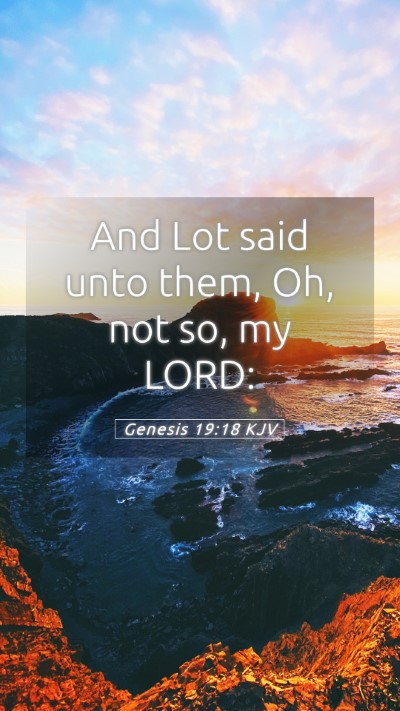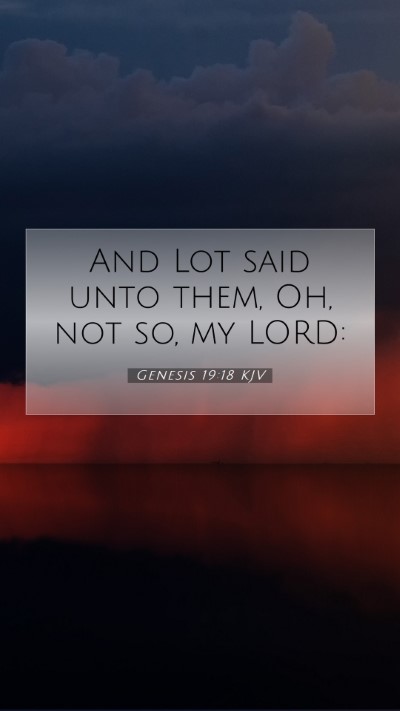Understanding Genesis 19:18 - Bible Verse Commentary
Genesis 19:18 states: "And Lot said unto them, Oh, not so, my Lord:" This verse is part of the narrative concerning the destruction of Sodom and Gomorrah, where Lot pleads for mercy for the city of Zoar as he seeks refuge from God's impending judgment.
Bible Verse Meanings and Interpretations
This verse highlights the human emotions of fear and desperation in the face of divine judgment. Lot's response reflects both his understanding of the imminent doom and his personal desire to save himself and his family.
Matthew Henry's Commentary
Matthew Henry notes that Lot's plea shows his awareness of the broader implications of God's judgment. Lot recognized the severity of the circumstances, and his statement signifies a mix of urgency and humility before divine authority.
Albert Barnes' Exegesis
Albert Barnes emphasizes the significance of Lot's intercession, suggesting that it reveals his concern not only for his own safety but also for the fate of others. Barnes points out Lot's reluctance to flee to the mountains, indicating the human tendency to cling to comfort even in perilous circumstances.
Adam Clarke's Insights
Adam Clarke elaborates on the context of this plea, asserting that it illustrates the struggle between faith and fear. Lot's reluctance to move toward the mountains signifies a lack of complete trust in God's provision, thereby emphasizing the theme of faith in divine protection.
Key Themes and Analysis
- The nature of divine mercy: Lot’s plea exemplifies the theme of seeking refuge in God's mercy amidst judgment.
- Human apprehension: The fear Lot exhibits when warned of the impending destruction speaks to the universal human experience of anxiety when faced with life-threatening situations.
- The balance of free will and divine intervention: Lot's choices and pleas to God emphasize the tension between human agency and divine sovereignty.
The Historical Context of Genesis 19:18
Interpreting Genesis 19:18 requires an understanding of the historical and cultural background of Lot's time. The cities of Sodom and Gomorrah were infamous for their wickedness, and Lot lived in a society that heavily contrasted with the values upheld by Abraham. This verse encapsulates the urgent plea of a man trying to navigate a corrupted world while seeking to align with divine directives.
Application of Genesis 19:18 to Daily Life
This scripture serves as a poignant reminder to seek God's guidance and mercy during difficult times. The modern reader can draw parallels to their own lives, especially in moments of crises where reliance on faith can lead to divine provision and protection.
- Seeking guidance: Just as Lot sought guidance through his plea, individuals today should pray for wisdom and discernment in their own decisions.
- Trusting in divine mercy: Recognizing that divine mercy is available even in dire circumstances can bring comfort and hope.
- The importance of intercession: Lot’s role can inspire individuals to intercede for others facing challenges, underscoring the power of prayer in collective crises.
Additional Bible Cross References
- Genesis 18:23-26: Abraham's intercession for Sodom portrays the moral concern for the righteous amidst the wicked.
- Matthew 10:15: The New Testament reference to city judgment reflects the ongoing narrative of divine justice.
- Luke 17:28-30: This passage ties Sodom's judgment to lessons on preparedness for Christ's return.
Conclusion
In summary, Genesis 19:18 encapsulates profound themes of human emotion, divine mercy, and moral responsibility. Through various commentaries, we see that understanding this verse requires not only a careful look at Lot's character but also the larger implications of faith and intercession. Whether in personal Bible study or group discussions, this verse can lead to insightful dialogues about the nature of God's judgment and mercy, encouraging deeper biblical analysis and application in daily life.


